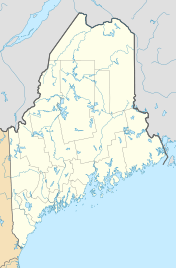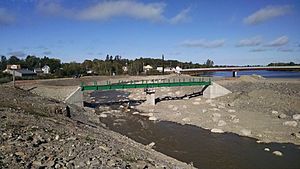Howland Dam (Maine) facts for kids
Quick facts for kids Howland Dam |
|
|---|---|
|
Location of Howland Dam in Maine
|
|
| Country | United States |
| Location | Howland, Penobscot County, Maine |
| Coordinates | 45°14′20″N 68°39′24″W / 45.2387600°N 68.656600°W |
| Dam and spillways | |
| Impounds | Piscataquis River |
The Howland Dam is a special kind of wall built across the Piscataquis River in Howland, Maine. This dam is located right where the Piscataquis River joins the larger Penobscot River. It was originally used to create electricity from the flowing water.
Contents
What is the Howland Dam?
The Howland Dam is a hydroelectric dam. This means it uses the power of moving water to make electricity. Dams like this are important for providing energy to homes and businesses. They also help control the flow of rivers. The Howland Dam is located in Penobscot County, Maine.
Location and Rivers
The dam sits at a place called a "confluence." This is where two rivers meet. In this case, it's where the Piscataquis River flows into the Penobscot River. The Penobscot River is one of the longest rivers in Maine. It is very important for the state's history and environment.
A New Purpose for the Dam
Over time, people realized that dams could block fish from moving freely up and down rivers. Many fish, like salmon, need to travel far upstream to lay their eggs. The Howland Dam was one of these barriers.
The Penobscot River Restoration Project
In 2010, a group called the Penobscot River Restoration Trust bought the Howland Dam. They bought it from a company named PPL Corporation. This purchase was part of a much bigger plan. The goal was to help fish and other wildlife move more easily along the Penobscot River system. This project aimed to bring back fish populations that had declined.
Building a Fish Bypass
To help the fish, a special path was built around the dam. This path is called a "fish bypass." It was finished in 2015. The bypass allows fish to swim past the dam safely. This means they can reach their natural spawning grounds upstream. It helps connect different parts of the river system again.
 | Janet Taylor Pickett |
 | Synthia Saint James |
 | Howardena Pindell |
 | Faith Ringgold |



